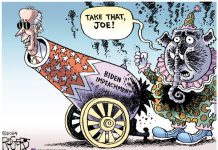I remember sitting in an undergraduate philosophy class at Hanover College in which the professor, discussing the limitations, nuances and intricacies of human language, explained to us that while we English speakers have one word for the frozen precipitation that falls from the sky, snow, the Inuit people have more than 50 words to describe every variation and type of snow.
I have to admit at being amazed at such detail of observation and nuance of experience.
There is a real beauty in being able to use descriptive words and language to paint a mental picture for others that is rich and vibrant in its specificity and detail. As a writer, I am continually reminded of the importance of words and how appreciative readers are at being able to participate in an experience, at being able to feel a visceral connection, and at being able to imagine the intricate details of an image — all through words.
Words can bring observations and experiences to life.
However, our diversity in words and language make us expert classifiers and near-obsessive labelers.
And you may be wondering why you picked up on a bit of cynicism with that last sentence.
While we all may not have the exhaustingly expressive, yet delightfully observant-of-every-fine-detail chops of Dostoevsky, we all have an almost innate need for descriptors. We are hard-wired, it seems, with the ability to observe, discriminate, label and classify.
Of course, this is not inherently bad and actually serves many good and useful purposes.
Rather than seeing people as they are, rather than enjoying experiences for what they are, we very naturally, maybe even unconsciously, begin to divide all things into categories and groups. That can then very easily lead to the creation of dualities and hierarchies, and then ultimately antagonisms and conflicts among the divisions, simply by the categories in which we place people and experiences — and then by what we subsequently believe about them based solely upon how they are described, labeled or categorized.
Let me be very clear in what I am saying.
We live in a time in which there are hyper-obsessions with how we describe ourselves, how we label others and put them into categories, how we begin to assign worth and value based upon the label a person or group wears and the category in which a person or group identifies, and then how we begin to live in division and conflict, either mentally or physically, with a labeled and categorized person or group.
All without ever knowing the person behind the label.
The sad and tragic reality is that underneath a label or a classification is a person, a flesh-and-blood human being — often one who is stereotyped and caricatured, not for the depth of who they are, or as one uniquely created by God, but as an object that can be disrespected, diminished and discarded.
God help us.
As one who actually believes that the time in which we live is rich with opportunity for a new and better humanity (and maybe it has taken us seeing the ugliness of humanity for us to have a longing for a new kind of humanity), I want to invite you out of the division and destruction and antipathy and hatred that surrounds us, maybe even that in which you have participated, and into a uniting and edifying reality built upon goodness and love for all people that no longer sees the world as we versus they, but simply as we.
I am not sure if you have ever considered this, but up until the time of Jesus the trajectory of the biblical narrative was a devolution into division, classification and labeling that then further disintegrated into dualistic thinking, hateful discrimination, fearful xenophobia, we/they mentalities, cyclical conflicts, ethnic and religious prejudices, political animosities and perpetual wars.
And this cycle played out over and over and over and over.
Does it sound familiar?
But with the introduction of Jesus, this tired and predictable trajectory ended.
In Jesus you find the most revolutionary, counter-cultural, and radical movement in the history of the planet.
And that is not some crazy, religious claim.
At the height of dualistic thinking, hateful discrimination, fearful xenophobia, we/they mentalities, cyclical conflicts, ethnic and religious prejudices, political animosities, and perpetual wars, Jesus started a movement away from classifications, labels and divisions, which then began to erase dividing lines and hierarchies and conflicts — all with the most unlikely people from every disparate part of life.
Jesus faced, head on, ethnocentrism and racism. Jesus stood up to inequality and social stratification. Jesus embraced the uncivilized, the disabled, the outcast, the stigmatized, the unclean, the infected the sinner. Jesus broke every glass ceiling of every institution and construct of his time (and even ours today).
No longer were people to be seen as Jew or Gentile, rich or poor, male or female, barbarians or civilized, clean or unclean because in Christ there is one new humanity.
No longer were people to be labeled or classified, divided against or placed in hierarchies, live in conflict or hostility, because in Christ there is one new humanity.
In this one new humanity, Christ is all, and is in all. And in this one new humanity we no longer regard anyone from a worldly point of view. In Christ, the old ways have gone, and the new ways have come — one new humanity. For in this one new humanity, we unite and align in Christ and in values that transcend every dividing line.
That is the radical beauty of the message Jesus preached, that humanity would no longer align by label or classification, but would unite and align in a love that transcends every label, every classification, every ideology and every division.
No longer are we to be Protestant or Catholic, conservatives or progressives, Democrats or Republicans, legals or illegals, Black Lives Matter or All Lives Matter, privileged or under-privileged, gay or straight, transgendered or cisgendered, American or Pakistani or Afghani or Korean or Venezuelan, because in Christ there is one new humanity.
For it is through Christ in which all things were created. And by Christ that all things hold together. And in Christ that God reconciled all things to himself. That’s the good news.
And we continue this reconciliation by inviting everyone out of the labels, classifications, dividing lines and hostilities.
The love of Christ transcends every label, every descriptor, every classification and every dividing line. And it is the love of Christ alone in which we should find our identity and the only place where we should reside, for it is the only place where every person in the world is welcome, treated equally and loved fully for who they are.
Brandon Andress of Columbus is a former local church leader, a current iTunes podcast speaker and a contributor to the online Outside the Walls blog. He can be reached at his website at brandonandress.com.




